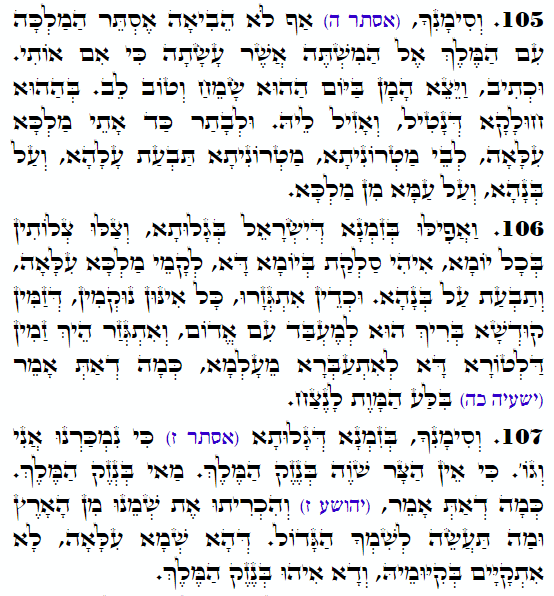Daily Zohar # 3865 – Tetzaveh – The King’s loss is our protection
Daily Zohar 3865

Hebrew translation:
106. וַאֲפִלּוּ בִּזְמַן שֶׁיִּשְׂרָאֵל בְּגָלוּת וּמִתְפַּלְלִים תְּפִלּוֹת בְּכָל יוֹם, הִיא עוֹלָה בְּיוֹם זֶה לִפְנֵי הַמֶּלֶךְ הָעֶלְיוֹן וּמְבַקֶּשֶׁת עַל בָּנֶיהָ, וְאָז נִגְזָרוֹת כָּל אוֹתָן נְקָמוֹת שֶׁעָתִיד הַקָּדוֹשׁ בָּרוּךְ הוּא לַעֲשׂוֹת עִם אֱדוֹם, וְנִגְזָר אֵיךְ עָתִיד הַמְקַטְרֵג הַזֶּה לַעֲבֹר מִן הָעוֹלָם, כְּמוֹ שֶׁנֶּאֱמַר (ישעיה כה) בִּלַּע הַמָּוֶת לָנֶצַח.
107. וְסִימָנְךָ – בִּזְמַן הַגָּלוּת (אסתר ז) כִּי נִמְכַּרְנוּ אֲנִי וְגוֹ’. כִּי אֵין הַצָּר שֹׁוֶה בְּנֵזֶק הַמֶּלֶךְ. מַה זֶּה בְּנֵזֶק הַמֶּלֶךְ? כְּמוֹ שֶׁנֶּאֱמַר (יהושע ז) וְהִכְרִיתוּ אֶת שְׁמֵנוּ מִן הָאָרֶץ וּמַה תַּעֲשֵׂה לְשִׁמְךָ הַגָּדוֹל. שֶׁהֲרֵי הַשֵּׁם הָעֶלְיוֹן לֹא מִתְקַיֵּם בְּקִיּוּמוֹ, וְזֶהוּ בְּנֵזֶק הַמֶּלֶךְ.
.
Zohar Tetzaveh
We are continuing from the previous DZ, the study about the two goats used in the service of Yom Kippur in the Holy Temple.
#105
Queen Esther invited the King to a special feast and asked to include Haman in the feast. She wanted to ask the King to cancel Haman’s plan to kill her people.
Esther 5:9
“וַיֵּצֵא הָמָן בַּיּוֹם הַהוּא שָׂמֵחַ וְטוֹב לֵב וְכִרְאוֹת הָמָן אֶת מָרְדֳּכַי בְּשַׁעַר הַמֶּלֶךְ וְלֹא קָם וְלֹא זָע מִמֶּנּוּ וַיִּמָּלֵא הָמָן עַל מָרְדֳּכַי חֵמָה.”
“So Haman went out that day joyful and with a glad heart; but when Haman saw Mordecai in the king’s gate, and that he did not stand or tremble before him, he was filled with indignation against Mordecai.”
Haman was happy with the invitation that the King honored him.
Esther 5:12
“וַיֹּאמֶר הָמָן אַף לֹא הֵבִיאָה אֶסְתֵּר הַמַּלְכָּה עִם הַמֶּלֶךְ אֶל הַמִּשְׁתֶּה אֲשֶׁר עָשָׂתָה כִּי אִם אוֹתִי וְגַם לְמָחָר אֲנִי קָרוּא לָהּ עִם הַמֶּלֶךְ.”
“Moreover, Haman said, “Besides, Queen Esther invited no one but me to come in with the king to the banquet that she prepared; and tomorrow I am again invited by her, along with the king.”
When the supernal King comes to the queen’s home, the queen asks the King for her, her children, and her people.
#106
When Israel is in Exile and do their prayers every day, Malchut ascends on Yom Kippur and comes in front of the King to ask for her children. Then decrees are made to take revenge on the kingdom of Edom in the future by the Holy One Blessed be He.
Also, a decree is made about how the ‘prosecutor’ that tells about the sins of Israel would be removed from the world, as we read that death would be swallowed forever in Isaiah 25:8
“בִּלַּע הַמָּוֶת לָנֶצַח וּמָחָה אֲדֹנָי יְהוִה דִּמְעָה מֵעַל כָּל פָּנִים וְחֶרְפַּת עַמּוֹ יָסִיר מֵעַל כָּל הָאָרֶץ כִּי יְהוָה דִּבֵּר.”
“He will swallow up death forever, And YHVH GOD will wipe away tears from all faces; The rebuke of His people He will take away from all the earth; For YHVH has spoken.”
#107
Esther 7:4
“כִּי נִמְכַּרְנוּ אֲנִי וְעַמִּי לְהַשְׁמִיד לַהֲרוֹג וּלְאַבֵּד וְאִלּוּ לַעֲבָדִים וְלִשְׁפָחוֹת נִמְכַּרְנוּ הֶחֱרַשְׁתִּי כִּי אֵין הַצָּר שֹׁוֶה בְּנֵזֶק הַמֶּלֶךְ.”
“For we have been sold, my people and I, to be destroyed, to be killed, and to be annihilated. Had we been sold as male and female slaves, I would have held my tongue, although the enemy could never compensate for the King’s loss.”
Esther explains to the King that the opposite side wishes to destroy her people, which would be a King’s loss.
The Zohar asks, what is the King’s loss and answer by quoting Joshua 7:9
“וְיִשְׁמְעוּ הַכְּנַעֲנִי וְכֹל יֹשְׁבֵי הָאָרֶץ וְנָסַבּוּ עָלֵינוּ וְהִכְרִיתוּ אֶת שְׁמֵנוּ מִן הָאָרֶץ וּמַה תַּעֲשֵׂה לְשִׁמְךָ הַגָּדוֹל.”
“For the Canaanites and all the inhabitants of the land will hear it, and surround us, and cut off our name from the earth. Then what will You do for Your great name?”
After the people of Israel sinned and angered Hashem, they lost the next battle. Joshua pleads to Hashem, telling him that Israel carries his name, and if they lose battles, his name would be lost together with the loss of Israel.
Lesson;
The Zohar brings the example from the scroll of Esther as an analogy to our connection to the King on Yom Kippur. Esther, Malchut, approaches the King, Hashem, and presents the case that we should not lose to the negative side because we carry his name.
The children of Israel held the name of Hashem for thousands of years, even when they are in Exile, scattered all over the world. As long as they keep their connection to the Torah, which is the name of God, Israel will never eradicate them from the world as the other side wishes to do to all God-loving people. They are punished in many ways for their sins, but they will never be extinct.
Nowadays, the evil side wishes to disconnect the people of God from their faith by imposing different rules to limit their God-Given Rights. We must keep the faith and have certainty in Hashem to survive the battle against evil.
{||}

 Previous: Tetzaveh
Previous: Tetzaveh
